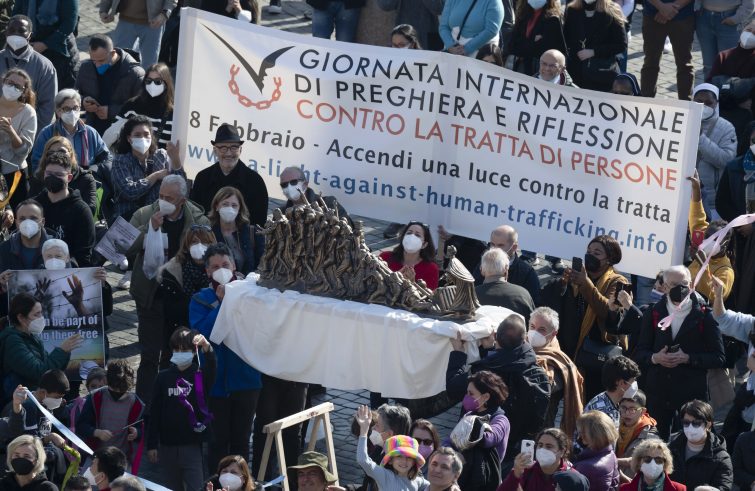
An eight-hour marathon of prayer, testimonies and reflections will be livestreamed with contributions from Oceania, Asia, the Middle East, Africa, Europe, South America and North America. The online event, which begins at 9 a.m. is a highlight of the eighth International Day of Prayer and Awareness Against Human Trafficking, on the theme: “The Power of care – women, economy and human trafficking.” The Day, first called for by Pope Francis in 2015, marks the feast day of St. Josephine Bakhita, a former enslaved Sudanese girl who later became a nun. In 2000, she was declared a saint by John Paul II. She is the universal symbol of the Church’s commitment against human trafficking. In anticipation of the event, everyone gathered at Pope Francis’ Angelus prayer in St Peter’s Square on February 6, with banners and a sculpture of St Bakhita created by Canadian artist Timothy Schmaltz, entitled ‘Let the oppressed go free’.
 The work of art is dedicated to the victims of trafficking and to all women, especially the nuns actively working for their liberation. It depicts the Sudanese saint lifting a trapdoor to free a hundred women. The event is coordinated by Talitha Kum, a global anti-trafficking network of more than three thousand Catholic Sisters and friends and partners, and is promoted by the International Union of Superiors General, in partnership with the Migrants and Refugees Department of the Vatican’s Dicastery for Promoting Integral Human Development, Caritas Internationalis, the World Union of Catholic Women’s Organisations, the Focolare Movement, the Jesuit Refugee Service and many other organisations around the world. As in previous years, a message from Pope Francis is due to be released on 8 February.
The work of art is dedicated to the victims of trafficking and to all women, especially the nuns actively working for their liberation. It depicts the Sudanese saint lifting a trapdoor to free a hundred women. The event is coordinated by Talitha Kum, a global anti-trafficking network of more than three thousand Catholic Sisters and friends and partners, and is promoted by the International Union of Superiors General, in partnership with the Migrants and Refugees Department of the Vatican’s Dicastery for Promoting Integral Human Development, Caritas Internationalis, the World Union of Catholic Women’s Organisations, the Focolare Movement, the Jesuit Refugee Service and many other organisations around the world. As in previous years, a message from Pope Francis is due to be released on 8 February.
The online prayer marathon will run from 9 a.m. to 5 p.m. (Italian time). It will be live streamed in five languages (French, English, Italian, Portuguese, Spanish) on the Day’s website http://www.preghieracontrotratta.org, with testimonies from more than thirty countries. Religious and consecrated persons will be taking part, along with survivors, activists, voluntary workers, economists and businesswomen. A Twitter storm will take place on the same day, with an invitation to tweet about the day from 1.30 p.m. to 2.30 p.m. hashtag #PrayAgainstTrafficking.
 Casa Bakhita in Gaeta. Also attending the online event will be the volunteer helpers of Casa Bakhita, a shelter run by the diocesan Caritas of Gaeta. The project was launched in 2019, but owing to restrictions linked to the pandemic it only opened a year ago. The facility can accommodate six women at the same time, plus a care worker. Seven women have been admitted in one year, mostly Nigerian, but also Romanian and Latin American. “Ours is a top-level shelter,” Maria Giovanna Ruggeri, one of the coordinators and former president of the World Union of Catholic Women’s Associations (WUCWO), told SIR.
Casa Bakhita in Gaeta. Also attending the online event will be the volunteer helpers of Casa Bakhita, a shelter run by the diocesan Caritas of Gaeta. The project was launched in 2019, but owing to restrictions linked to the pandemic it only opened a year ago. The facility can accommodate six women at the same time, plus a care worker. Seven women have been admitted in one year, mostly Nigerian, but also Romanian and Latin American. “Ours is a top-level shelter,” Maria Giovanna Ruggeri, one of the coordinators and former president of the World Union of Catholic Women’s Associations (WUCWO), told SIR.
We shelter girls who have just escaped from the trafficking ring.
They are sent to us by law enforcement agencies, by Caritas of Frosinone, Castel Volturno, all areas with a high rate of prostitution. Some of them were brought directly to our front door. The girls are traumatised, they don’t speak our language, they have no papers. In this phase we help them obtain the necessary documents, we organise Italian, cooking, sewing and drawing courses.
Since it is a protected structure, they cannot go out or use their mobile phones. It’s dangerous, the traffickers keep threatening them.
After a few months, those who decide to further pursue this path are sent to second and third level shelters, where they are helped to reintegrate into society and become independent. Not all stories are successful. “So far, 40% of the girls we have taken in have found a job and a new life. The others are re-contacted by their captors and relapse into slavery. “Unfortunately, many are illiterate and naive. They are chosen by human traffickers also for this reason. They lack the strength to rebel, they are resigned to that life.”
The pandemic aggravated the situation. Lockdowns and restrictions linked to the health crisis made things worse.
“They used to be on the streets, now they are exploited in closed houses and work online.
They never go out, so they are very hard to approach, unless they escape.” “The pandemic increased the number of people at risk for human trafficking, it aggravated the vulnerability of those most at risk and the inequalities between men and women”, says Sister Gabriella Bottani, coordinator of the Day. “We women, must therefore be the driving force in promoting a new economic system based on the power of care. On this Day, we will reflect together on the causes of human trafficking and identify pathways to liberation. The violence caused by exploitation can be transformed with gestures of solidarity and care.” UN data show that girls and women make up 72% of all victims of human trafficking.











